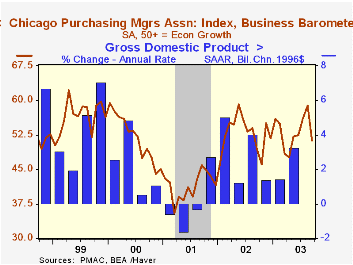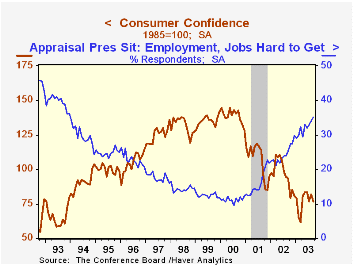 Global| Sep 30 2003
Global| Sep 30 2003Weekly Chain Store Sales Fell Again
by:Tom Moeller
|in:Economy in Brief
Summary
Chain store sales fell 0.4% last week. It was the third consecutive weekly decline according to the BTM-UBSW survey. The decline in sales followed a huge 1.8% slide the prior week as Hurricane Isabel struck. It pulled the level of [...]

Chain store sales fell 0.4% last week. It was the third consecutive weekly decline according to the BTM-UBSW survey.
The decline in sales followed a huge 1.8% slide the prior week as Hurricane Isabel struck. It pulled the level of sales in September 0.7% below the August average with just a few days left to be tallied.
During the last five years there has been a 62% correlation between the year-to-year percent change in chain store sales and the change in non-auto retail sales less gasoline.
The BTM-UBSW retail chain-store sales index is constructed from the sales results reported by seven retailers: Dayton Hudson, Federated, Kmart, May, J.C. Penney, Sears and Wal-Mart.
| BTM-UBSW (SA, 1977=100) | 9/27/03 | 9/20/03 | Y/Y | 2002 | 2001 | 2000 |
|---|---|---|---|---|---|---|
| Total Weekly Retail Chain Store Sales | 418.7 | 420.2 | 4.4% | 3.6% | 2.1% | 3.4% |
by Tom Moeller September 30, 2003

The Chicago Purchasing Managers Business Barometer for September fell much more than expected to 51.2 from 58.9 in August. Consensus expectations had been for a more moderate decline to 57.0.
All of the component indexes fell with the exception of inventories. Production (55.8) and orders (53.2) fell to the lowest levels since April. Employment also retraced most of the prior two months' modest improvement.
During the last twenty years there has been a 57% correlation between the level of the Chicago PMI and quarterly growth in real GDP.
The index of prices paid fell to 51.8.
View the latest release from the Chicago Purchasing Managers here.
| Chicago Purchasing Managers Index, SA | Sept | Aug | Y/Y | 2002 | 2001 | 2000 |
|---|---|---|---|---|---|---|
| Business Barometer | 51.2 | 58.9 | 49.4 | 52.7 | 41.4 | 51.8 |
| New Orders | 53.2 | 60.5 | 51.3 | 56.3 | 42.3 | 53.1 |
| Prices Paid | 51.8 | 52.4 | 59.1 | 56.9 | 50.4 | 65.6 |
by Tom Moeller September 30, 2003

The Conference Board’s Index of Consumer Confidence in September slid to the lowest level since March. The index fell 6.0% from August to 76.8. That was versus Consensus estimates for a reading of 81.5.
Consumers' gloom translated into sharp cutbacks in plans for purchasing a home and major appliances. Plans to buy carpet or an automobile also fell.
The drop in Confidence was deeper than the 1.8% September decline in Consumer Sentiment reported by the University of Michigan.
Lower Confidence reflected a 6.9% (-9.1% y/y) drop in the index of consumer expectations.Consumers' read of the present situation fell 4.0% (-32.8% y/y) for the seventh drop this year.
Jobs were viewed as hard to get by 35.3% of respondents. Expectations rose that in six months there would be fewer job opportunities. This rise in pessimism erased all of a decline that occurred over the prior six months.
The Conference Board’s survey is conducted by a mailed questionnaire to 5,000 households and about 3,500 typically respond.
| Conference Board | Sept | Aug | Y/Y | 2002 | 2001 | 2000 |
|---|---|---|---|---|---|---|
| Consumer Confidence | 76.8 | 81.7 | -18.0% | 96.6 | 106.6 | 139.0 |
Tom Moeller
AuthorMore in Author Profile »Prior to joining Haver Analytics in 2000, Mr. Moeller worked as the Economist at Chancellor Capital Management from 1985 to 1999. There, he developed comprehensive economic forecasts and interpreted economic data for equity and fixed income portfolio managers. Also at Chancellor, Mr. Moeller worked as an equity analyst and was responsible for researching and rating companies in the economically sensitive automobile and housing industries for investment in Chancellor’s equity portfolio. Prior to joining Chancellor, Mr. Moeller was an Economist at Citibank from 1979 to 1984. He also analyzed pricing behavior in the metals industry for the Council on Wage and Price Stability in Washington, D.C. In 1999, Mr. Moeller received the award for most accurate forecast from the Forecasters' Club of New York. From 1990 to 1992 he was President of the New York Association for Business Economists. Mr. Moeller earned an M.B.A. in Finance from Fordham University, where he graduated in 1987. He holds a Bachelor of Arts in Economics from George Washington University.






